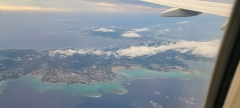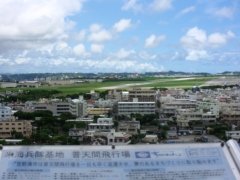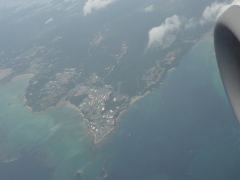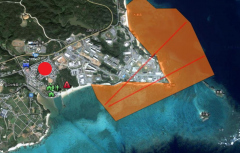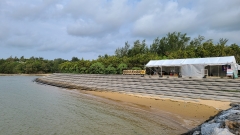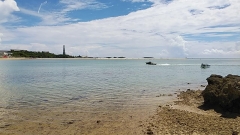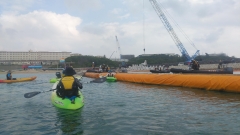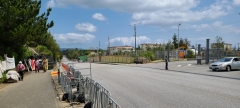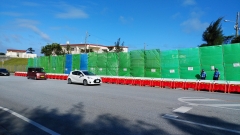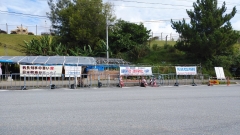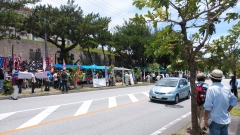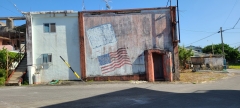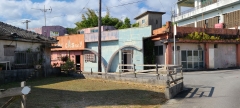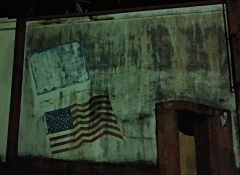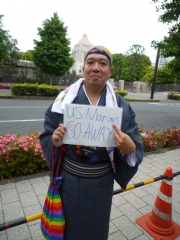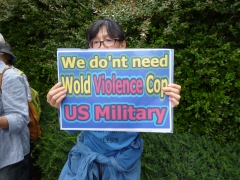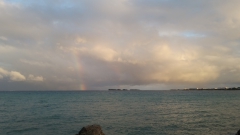12 July 2022
Novel: "Henoko Bar, Stars and Stripes" Chapter 1 "Children Who Don't Know about Wars"
The novel is based on this issue and my own experience.
In Henoko, Nago City, Okinawa Prefecture, shaken by the issue of the construction of a new U.S. military base, a female singer time slips to the time in the midst of the Vietnam War. What is the Henoko New Base Issue? What was the Vietnam War? What is America? What is Okinawa?
A short story in 9 chapters. Each chapter features famous songs from Japan, the United States and Okinawa.
Translation of this Japanese novel.
August 2018
Naomi Yamaguchi was walking on the streets at night in the Henoko district of Nago City, Okinawa Prefecture in a slightly drunken state. She had just come out drinking at a bar. Coming from Tokyo, she didn't seem to be welcome here. Not because she was from Tokyo, but because she was part of an activity that wasn't welcomed by the residents of the area.
Naomi was a singer from Tokyo. She was twenty-six years old. Although she was born and raised in Yokohama, she had lived and worked as a singer who sang while playing guitar and piano in live houses and cabarets. She liked to sing since she was a child. She’s been learning singing seriously since kindergarten and piano and guitar since elementary school.
She has overwhelmed the surroundings with her outstanding sense of sound and vocal volume. Naomi was said to be talented. In addition, she was a beautiful woman who could even become an actress and model that she recognizes by herself and others. In addition to her work as a singer, she also made money by modeling for magazines and advertisements.
She traveled to Europe for about three years to learn singing. She stayed in England for about a year. While studying traditional music such as opera, canzones, chansons and Scottish folk songs, she was a singer with a wide range of genres and sang songs such as contemporary rock and ballads. She loved learning and singing any song in the world.
Naomi was a singer who sold beautiful voices, but she was an unknown singer who worked at ordinary live houses and cabarets. Then came a big opportunity for her. The manager of an entertainment production company who visited the live house approached her about signing a contract. It promised to debut on a TV show with big sponsors and in music sales. Not only as a singer, but also because of her good looks, he recommended her about being able to work as an actress.
She got on it because it was a very attractive opportunity, but it was a trap. The manager was a middle-aged man who looked like a con, but he was really a con man. He invited her to talk about the contract at a bar in Shinjuku Kabukicho, Tokyo's downtown, and took her to a private room in the back of the bar, where he let her drink more and more alcohol. When Naomi started to get drunk, he suddenly hugged and kissed her.
She screamed loudly, but she was drunk, and caught up in the couch that she couldn’t resist. Just when she thought she was in a helpless situation, an unexpected savior appeared. A tall young man kicked the door of the private room, pulled the manager away from her, and punched him in the face. The manager collapsed to the floor and fainted.
He saved her from the brink of crisis. It was as if she had been saved by a knight on a white horse, and she fell in love with the young man at once.
The young man's name was Genjiro Shimabukuro. He was a young man from Okinawa prefecture. He was a graduate student a little younger than her. He has a fierce countenance. He hoped to become a lawyer while attending a law school in Tokyo.
Naomi wanted to do something to thank him for his help, and Genjiro asked her if she could go to Okinawa with him. Genjiro occasionally returns to his hometown of Okinawa to join the anti-U.S. military base struggle. There, he said, she could use her talent as a singer. Naomi was of course happy to oblige.
Naomi had never been to the Okinawa island before, but she was excited. Speaking of Okinawa, Naomi had a strong image of a resort island. She could go there with a young man like a knight on a white horse.
On a plane from Haneda Airport, Genjiro Shimabukuro and Naomi Yamaguchi arrived in Okinawa, a midsummer coral island.
Genjiro taught her history of Okinawa as a native man. Some of the facts were overlapped with the knowledge she already gained in history classes in schools.
Okinawa had been an independent kingdom until late 19th century like Hawaii in US but the kingdom was annexed to the mainland Japan. In 1945, when Japan surrenderred to the US, Okinawa was occupied by the US military and had been under US control until 1972.
Genjiro was from Ginowan city of Okinawa Prefecture, where Futenma Air Base is. He took Naomi around the U.S. Marine Corps Futenma Air Base, which occupied the land in the middle of Ginowan City, surrounded by wire mesh and explained the anti-base activities he was involved in from the observation deck of the park where the entire Futenma base could be seen.
Futenma Air Base was built after the war by the U.S. military confiscating private lands. Helicopters and aircrafts take off and landing make terrible noise, and the surrounding area is a densely populated urban area. It is also very dangerous when an accident occurred.
In 1996, the U.S. and Japanese governments agreed to return the land, but with terms attached. The idea was to build a base with the same function in another location on the same main island of Okinawa.
For residents living in Ginowan, this would lead to the elimination of the noise and risk of accidents, but for the people of Okinawa Prefecture as a whole, the burden of the base would remain unchanged. It is not fair to think that more than 70% of all U.S. military base and facility area in Japan, are placed in Okinawa which accounted for only about 1% of the total area of Japan.
The majority of Okinawans insisted that if the Futenma Air Base was to be relocated, it should be outside of Okinawa Prefecture. But the Japan government continued to adhere to the policy of relocation within the prefecture.
The relocation site was determined to be Henoko on the east coast of Nago City, located in the northern part of the main island of Okinawa. It was home to Camp Schwab, a U.S. Marine Corps training base. It was a base with a beach facing the coast, and the idea was to reclaim the beach and build two runways.
The Henoko area around Camp Schwab had far fewer people than Futenma Base surrounding area and it was like a village lined with private houses and small shops, and it had the atmosphere of an idyllic country town. Compared to Tokyo, it was much quieter. She went to Henoko with Genjiro. It was about an hour drive from Futenma. It was a different world for Naomi, a city woman.
It sounded reasonable to claim that it was safer than Futenma because it was not a densely packed and the village was facing the coast, but in fact it had other various problems. Even though there were fewer people than Futenma, there were people living there. More than 1,000 people had taken up residence around Camp Schwab.
The Henoko sea, which would be reclaimed in the area, was home to rare coral reefs and the endangered marine mammal dugong. There are many problems from the viewpoint of nature conservation.
More recently, a problem had emerged that it might be impossible to complete even if the land was reclaimed because of the deep soft ground in the reclaimed sea area. In that case, it was impossible for Futenma Air Base to be returned. For these reasons, Okinawa Prefecture revoked the approval of the Okinawa Defense Bureau, the prefectural authority, for a landfill, which was the owner of the construction work. However, the Ministry of Defense has restarted the construction with the court invalidating the prefecture’s revocation.
The installation of seawalls to reclaim the coast of Henoko is progressing steadily. The sea was surrounded by a seawall wharf and sediment was poured into it.
After the relocation plan was announced, people from inside and outside Okinawa Prefecture gathered in Henoko and campaigned against the construction.
From the beach, where the revetment for reclamation could be seen, tents had been set up to monitor the construction. She looked out to sea from the tent.
It was a truly beautiful sea that shined in the light green color typical of Okinawa. The sea was separated by a seawall wharf. The beach is fenced on the border with the base.
When constructing a seawall or injecting sediment, activists took kayaks from the beach to the construction site at sea to protest.
On the road side of the Camp Schwab entrance gate on the land side, a larger tent was set up to accommodate hundreds of people. From there, they could monitor the construction vehicles entering the base, and when the construction vehicles entered, they sat in front of the gate and took action to prevent them.
Naomi looked at the Camp Schwab surrounded by wire mesh. Is this what a U.S. military base were? There were also U.S. military bases on the mainland Japan. Like Yokota Air Base in Tokyo and the naval base in Yokosuka, but these were located in the suburbs and were not conspicuous.
She was amazed at the sight of the line-up of wire mesh fence, as if intimidating to a small island like Okinawa. While driving from Futenma Air Base to Henoko, she saw a wire mesh fences one after another. It was a base island.
Naomi was to perform her singing proudly in the tent in front of the gate. After making speech to nearly a hundred activists gathered in the tent, Genjiro introduced her and she responded to a request to sing a song about the peace movement against the bases of war.
She brought a guitar. She was asked if she could sing a song about peace, and then suddenly came up with Gilleaux's "戦争を知らない子供たち, Senso Wo Shiranai Kodomotachi (Children Who Don't Know War)".
https://youtu.be/6zEAGUwjDNM?si=mZHELu2c9GSoI20S
The lyrics were something like, "We are the generation born after the war, that we grew up not knowing war, so we are children who know only peaceful times and do not know about wars."
Since the song was released in 1971, it seems that the song reflects an era in which the younger generation did not know about the war but adults still had strong memories of the 2nd world war. Nowadays, even adults did not know about war.
But inside the wire mesh fence, youngsters trained for war and wage war all over the world. More recently, it had also sent troops to the battlefields of Iraq and Afghanistan. The base for training such soldiers was Camp Schwab. If Futenma Air Base was relocated, it would become a base for a complete battle and attack position.
Naomi's singing voice impressed the audience. Everyone clapped and cheered, "Lovely, thank you." She was glad she came. It was a different atmosphere from the live house and cabaret customers.
That evening, Naomi and Genjiro went to a private inn in Henoko where activists from outside the island were staying. She stayed there, and Genjiro would drive to his parents' house in Ginowan tonight and drive back tomorrow. Naomi said to Genjiro.
"Hey, I've come to Okinawa for a while, so I want to try scuba diving, and surfing. Wiil you take me somewhere to do these tomorrow and you should know some good places because it's your home island."
Instantly, Genjiro's face changed. It turned angry look.
"Did you come to Okinawa with such a feeling? Activities are serious and desperate! Not a leisure. I'm leaving. I don't know about tomorrow. Suit yourself."
He said and quickly left the inn.
Naomi felt like she was pushed aside. She was stunned. Just when she thought she had been lured by the knight on the white horse, she was shoved away by the knight.
Maybe she was being sloppy. Speaking of Okinawa, she came here with the feeling of a resort vacation. She knew he was passionate about the anti-base movement, but she was not sure because she only just gotten to know him. Naomi was outraged that she had just learned about the Henoko base issue and that it was impossible for her to know everything about this issue immediately.
After having dinner at a private inn, she decided to take a walk around the town of Henoko at night. She was trying to change her mood. Unlike Shinjuku in Tokyo, it was really quiet. It's the middle of summer, but the nights were much cooler than in Tokyo. Is it because of the sea breeze? But it's quiet and dark, and there's nothing but street lamps or private house lights. Isn't there somewhere to drink? Even if there was no cabaret, she searched around for a bar or something.
She entered a bar about a three-minute walk from the inn. There was only one house. There was a small electric sign, so it looked like a bar where locals gathered. She went inside. There was a counter, and it seems that a middle-aged woman was a master.
There were already elderly male and female guests sitting there. She heard chatter. He had an accent in his language and was identified as a local.
Naomi asked, "Can I order a beer?" "Yes, please," the female master replied, pulling out a large mug of draught beer. It was a local Orion draft beer.
After a while, a customer at the counter spoke to Naomi.
"Aren't you the one who sang in the tent in front of the gate at lunchtime?"
said an old man.
"Yes, that's right."
"So you're a protestor of the base, are you from the Naichi?"
said an elderly woman.
"Naichi?" asked Naomi, startled by the unfamiliar words.
"Oh, the mainland" said the man.
"Yes, I'm from Tokyo."
When she answered, the atmosphere in the store suddenly changed.
"Oh god, you're coming from far away to do something, and we're in trouble."
"Are you not opposed to the construction of a new U.S. military base?"
Then the woman sitting beside him replied.
"We've lived with U.S. bases all our lives. We used to have a lot of U.S. soldiers, so there were a lot of bars open around here.
Now, the number of U.S. soldiers who come to train has decreased much to the point where they can meet the needs at the facility inside the Schwab base, but if a new U.S. military base is built, many soldiers and their families will live there, and we will also be able to make money.
We are annoyed that people say they are against the base. I want you to know that!"
Naomi was surprised to hear such things. She had already learnt the fact that there used to be a lot of bars for U.S. troops. While driving from the tent on the beach to the gate on land daytime, she passed through the village of Henoko, and at that time she saw a building with a large Stars and Stripes painted all over the wall of a two-story building with no window.
Picture of the Stars and Stripes in a building was like a bar billboard. It was like a painting that seemed to lure American soldiers, but the painting was faded as if it had not been used for a long time. In the surrounding area, as the man said, there were several buildings that looked like the remains of a bar that was once open. Traces of a flashy exterior were seen, but the houses were already abandoned.
"When was the past you are talking about?" asked Naomi.
"I think it was from before Okinawa reversion to Japan (1972)" to the end of that war."
said an old man.
"That war?"
"It was a big war that the U.S. was having before you were born, and a lot of American soldiers came to Schwab for training and dropped a lot of money."
What kind of war was it in what era? What was the war that America was at before I was born? Naomi thought in her head.
"So, go back mainland and don’t stir this town anymore."
The man said, and the old lady at the counter, the female master all nodded, and the mood turned grim.
Naomi got upset. After downing the beer, she put the money on the counter and quickly left the bar. Is this how they treat customers? Following Genjiro, she was treated badly twice overnight.
The intention to change her mood resulted in even worse.
There seemed no other bar where she could drink, and it was her nature to drink as much as possible at times like this. Then she wandered around the streets of the quiet and dark Henoko village.
She arrived at a building. This was the Stars and Stripes building she noticed in the daytime. In the dim light, she could see a wall of Stars and Stripes paintings, with a bar-like entrance door. However, she thought that it was a place like other buildings around there, that were no longer open and were already abandoned for demolition.
It was ridiculous to expect a fancy bar to drink freely in a country town like this. Naomi thought she had to go back to the inn. At that moment, a sound was heard from the Stars and Stripes building. She could hear the sound of people gathering and faintly the music.
Oh, she thought it might be open for business, so she opened the front door. The door was opened. The inside was crowded. There were a lot of tall young men.
People drinking at the counter, sitting at tables, and standing in empty spaces. Oh, they were all white men, and they all spoke in English. Oh, weren't they American soldiers? The bar was full of energy.
So, why were the American soldiers from Camp Schwab gathered here? Wasn't that different story from what the local people at the bar she went in were talking about earlier ?
Well, okay, Naomi thought she would get a drink there, and headed to the counter. In addition to the counter and table seating, the bar had a stage for live performance. The ceiling was high and there were big electric lights like chandeliers hanging.
It was gorgeous and had a nice atmosphere. Interior was a far cry from a hazy appearance from outside. Music was playing. It came from a jukebox? There was a record inside, and one put a coin in it to play music. Even such antique thing was placed. The song just playing was one of the oldies. Naomi knew this. It was Platters' "The Great Pretenders."
Naomi was surprised that such a great bar was open in Henoko.
To be continued in Chapter 2.
17:45 Posted in Music, My novel, US-Japan relationship, USA issues | Permalink | Comments (0) | Tags: history, war, vietnam, okinawa, racism
01 June 2015
Film "Pride" The oppressed united
I just happened to know this film while participating in Tokyo Pride Parade event.
It was British movie. The Japanese title was "Parade e Yokoso (Welcome to the Parade)"
The story is based on facts. In 1980's coal miners did strike against Thatcher adminisitration's policy to close down unprofitable mines.
Gay activists in London launched fund-raising campaign named "Lesbians and Gays support miners."
At first they were not accepted by miners' community but later on both sides understood significance of corporation getting over the difference. Like one of important characters said "You support us so we support you."
In the end, miners joined gay parade to show solidarity with the activists.
The both oppressed communities got united to help each other.
I recently came up with the idea of new novel using the concept of unification among oppressed communities. Gays are not the only oppressed but women, disables, and recently those who are fearing new foreign military base construction in their local prefecture, Okinawa, Southernmost prefecture of Japan. For details, please read the articles tagged Okinawa in this blog.
The mining town in the film was in Wales. It was several hour drive from London but very different culture and people exist, even language is different. One different tribe in one nation. That thing is very much like Okinawa.
I kind of do the similar action to the film, helping that prefecture people. On 24 May 2015 I joined protest activity such as human-chaining demonstration around Japan's Diet building in order to show solidarity with them.
Last year I saw the rainbow on the construction area. It appeared from the sea. The construction project is reclaiming the beautiful coral sea. It was on the same day after I attended Okinawa's gay pride event.
Well, it seems another oppressed ones got united helping each other for the better future.
Just my fantasy?
31 March 2015
Book: Germans living in Japan during the war time
I recently bought and read a very interesting book on Germans living in Japan during 1930's and 40's, when Japan was in war with China and the USA. The Japanese title is "Senjikano-Doitsujintachi." It illustrates very unique history between Japan and Deutchland.
There were estimated over 3000 Germans living in Japan in that period. That is as much as number of Germans living in Japan now.
During that time Japan was allied with Nazi-Germany. But the German law did not apply. So Jews could live safely in Japan. Not only Jews but exiles did like a former judge who convicted Hitler in 1920's. Other European nations were too close to Nazi-Germany so anti-Nazi people escaped to Japan crossing the Russia.
For them, Japan was like a paradise. Japanese respect Germans because Germany was considered a civilized nation that Japan should model after and was indeed the most important ally for Japan.
Nazi influence was already there. Nazis established a branch in Japan, early 1930's. However, in order to arrest anti-Nazi German citizen, they needed to ask Japanese police to do that. The Japanese at that time did not get along with Nazi ideology, expecially anti-Jew stuff.
Japan and Nazi-Germany made a Cultural agreement that bans using Jew-related materials in education. But even in 1940's Heinrich Heine poems were taught in Japanese colleges. No Japanese could not see the difference between Jews and non-Jews.
The wife of Foreign minister of Japan at that time was Jewish German. Japan was reluctant to corporate with Nazis in terms of oppression on Jews.
Not only Jews and anti-Nazi Germans but Germans who had lived in Indonesia which was former Dutch colony came to Japan after they were freed by the Japanese military. Germans in Indonesia were put in internment camp after Germany invaded Netherland. They were welcomed as citizens in an allied nation.
Japanese praised Hitler as a good and powerful allied nation's leader but did not care about details of Nazis policies. The Japanese government at that time corporated with Germany mainly to counter the U.S.
But after Gemany surrendered in May 1945. Their situation was drastically changed. Japanese thought Germany betrayed them. Some were arrested as enemy spies.
I am thinking of writing a fiction novel based on these facts.
Where the story took place is in Karuizawa, Nagano prefecture, highland resort for high-society in 1945. But there were Germans staying to escape from air-raid in ciities.
Some were Jew or anti-Nazi and some are nazi-sympathizers or nazi-officials dispatched from their homeland. They got along with Japanese who welcomed them feeling complicated. Some were very thankful but at the same time not very happy because Japan was allied with Nazis and some thought Japanese were second-class people not being white.
I guess it is going to be very interesting. In order to write a good story, I am now learning Heine's poems. It may be a main topic of the story.
17 August 2013
Making a novel based on my alma mater's history
Last month I attended my alma mater's alumni event in Tokyo.
A lot of alumni living in Japan gathered at a restaurant exchanging memories and update information of the university. One faculty member from SFSU joined and told me about current situation. I graduated in late 1990's. He said a lot more buildings were constructed on campus.
But most surprising attendees were alumnis who graduated in 1960's. They were oldest in the group. He told us about his experience in that period. There was a student strike movement in those days following civil rights act. Ethnic minority students demanded the university to require all the students take ethnic minority study related subjects. They had been frustrated with racism in the university. Classes were boycotted and school buildings were occupied. The president of the university was changed during that time. It was Dr. Hayakawa, Japanese American. He accepted that demand.
Since then SFSU requires all the students to complete ethnic minority related courses. I did, of course. I remember what I took were Japanese American studies, Black studies, LGBT studies, and history of Japanese and Chinese women. Those were greatest studies in my life.
That ethnic study requirement was what my alma mater first acquired and spread all over the US. It was a good thing that I am proud of as alumni.
So my novel idea is based on what I heard and I research.
One Japanese student who grew up in a conservative family, Hiroshima, 1960's joined the university. He longed for America and American culture. He met a lot of kind of students there and instructors. One of them was an English teacher who was Japanese American, strict and conservative. Because of his instruction his English ability improved faster.
The strike started. The president was changed. It was that Japanese American teacher. The Japanese boy expected him to understand the movement because of his ethnicity but he was actually opposing that movement and trying to supress the students.
The Japanese boy along with his friends who were white, Afro-American, Asian Americans negotiated with him. He used what he learnt and loathed from his childhood to convince the president. Japanese heritage, tea ceremony, Kendo and so on.
Sounds interesting, doesn't it?
The theme song should be "Blowing in the wind." The answer is blowing in the wind.
23:08 Posted in Culture, My novel, US-Japan relationship | Permalink | Comments (0) | Tags: literature, history, racism






